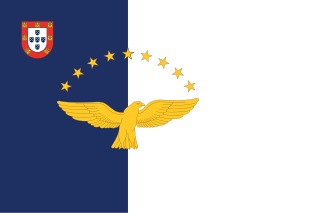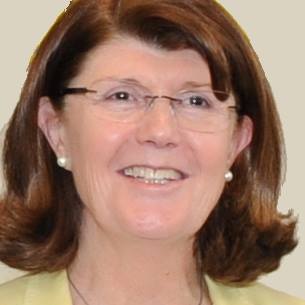
Carlos Manuel Martins do Vale César, GCC is a Portuguese politician and former President of the Regional Government of the Portuguese autonomous region of the Azores. He currently serves as member of the Assembly of the Republic, member of the Council of State and President of the Socialist Party.

The Azorean real, also known as the Azorean Moeda Insulana was the currency of the Portuguese archipelago of the Azores, used until 1931.

The Flag of the Azores is the regional flag of the Portuguese Autonomous Region of the Azores. It is a rectangular bicolour with a field unevenly divided into blue on the hoist, and white on the fly.
The Historical Institute of Terceira, or literally the Historical Institute of the Island of Terceira, or IHIT, is a private association and cultural institute and museum, dedicated to the investigation and studying of the islands of the Azores. The institute is headquartered in the classical Convent of São Francisco in Angra do Heroísmo.

The "Hymn of the Azores" is the official regional anthem used during some ceremonies in the Portuguese autonomous region of the Azores. For official purposes, the national anthem, "A Portuguesa", is always used during government events, in sporting venues, and during other civic ceremonies.

The Legislative Assembly of the Azores is the regional assembly/legislature of the Azores, an autonomous region of Portugal.

The political status of the Azores is defined by the Political-Administrative Statute of the Autonomous Region of the Azores, which acts as the standard legal constitutional framework for the autonomy of the Portuguese archipelago of the Azores. It defines the scope of the autonomous regional government and the structure and functioning of the region's organs of government within the framework of the 1976 Constitution of Portugal. The autonomous region of Madeira has a similar status.

The 2012 Azorean regional election was an election held on 14 October 2012 for the legislative assembly and government of the Portuguese autonomous region of the Azores. in which the Socialist Party nominee, under the leadership of Vasco Cordeiro won an absolute majority with 49% of the vote, in comparison to their direct rivals, the Social Democratic Party, who achieved only 33% of the vote. Voter turnout was low with just under 47.9% of the electorate casting their ballot on election day.
Azores Day is a regional holiday in the Portuguese archipelago of the Azores. It commemorates the establishment of Azorean political autonomy in the Portuguese Constitution, following the Carnation Revolution. The date corresponds to the Festival of the Holy Spirit, a celebration based in the archipelago's religious and cultural history, held on the Sunday of Pentecost, a movable public holiday observed only in the archipelago of the Azores.

The 11th Regional Legislature was formed after regional elections held on 14 October 2012, in which the Azores Socialist Party. Representatives of the Assembly were elected from 57 constituencies, with the majority of the seats occupied by members of the Portuguese Socialist Party (PS), under the leadership of Vasco Cordeiro, who headed the 21st Government of the Azores, during the 11th Regional Assembly.
The Protected Areas of the Azores are the basic administrative-territorial and conservation structures in the archipelago of the Azores and the surrounding oceans. The areas integrate the entirety of the Azores within its Exclusive Economic Zone, as well as the surrounding waters, under the international agreements and conventions. The network realizes the categorization of management for protected areas adopted by the International Union for Conservation of Nature (IUCN), adapting it to the specific geographical, environmental, cultural and political-administrative territory of the archipelago.
Alberto Madruga da CostaGC IH • GC M was a businessman, former politician and ex-President of the Legislative Assembly of the Azores from 1978-1979, and again in 1991-1995, including a brief span as President of the Government of the Azores, between 1995-1996.
José Guilherme Reis LeiteGC IH, is a professor, historian and Azorean politician, whose functions included his role as Regional Secretary for Education and Culture, deputy and President of the Legislative Assembly of the Azores, in addition to representative for the Azores in the Portuguese National Assembly.

The 2008 Azorean regional election was an election held on 19 October 2008 for the legislative assembly and government of the Portuguese autonomous region of the Azores. in which the Socialist Party, under the leadership of Carlos César won a third mandate with 46.7% of the turnout, while their rivals, under the Social Democratic Party leader Carlos Costa Neves, received 30.27% of the vote: the result would result Neves' resignation in the following days.
The Captaincy General of the Azores was a politico-administrative structure of governance imposed in the Azores on 2 August 1766, with its seat in Angra. It remained the de facto system of governance for 65 years, until it was abolished on 4 June 1832 by D. Peter IV, but by 1828 its de jure status had made it nonoperational, owing to the revolutionary movements that lead to the Liberal Wars. The creation of the Captaincy-General was part of the Pombaline reforms to the Portuguese administration, during the reign of Joseph I, under the initiatives of Sebastião José de Carvalho e Melo, 1st Marquis of Pombal, then prime minister. A Captaincy-General operated from the Palace of the Captains-General, under the direction of the titular Captain-General, who operated as the Governor of the Azores, with additional jurisdiction on every island of the Azorean archipelago. The Captaincy-General was succeeded by the Province of the Azores, an ephemeral administrative structure that was collapse in the immediate years.

Dionísio Mendes de Sousa is a Portuguese politician, writer, educator, and former president of the Legislative Assembly of the Azores.

José Mendes Melo Alves was an Azorean Politician who, in addition to other positions, was a member of the Junta Regional dos Açores and the Azores Regional Government and Presidency, elected to the Legislative Assembly of the Azores and the Assembly of the Republic (Portugal).

Maria Evelina de Sousa was a Portuguese educator and journalist who flourished during the early 20th century in Portugal. An active feminist, she participated in the struggles for equal rights for women and was a co-founder of the first animal rights organization in the Azores. Early biographies ignored that she was an open lesbian. In 2017, she was posthumously honored by the government with the Azorean Insignia of Recognition.

Berta Maria Correia de Almeida de Melo Cabral is an Azorean politician.
The Autonomic Insignia of Valour is the second highest honor awarded by the Regional Government of Madeira, which “aims to distinguish, in life or posthumously, citizens, communities or institutions that stand out for personal or institutional merits, acts, acts services rendered to the Region ”.









